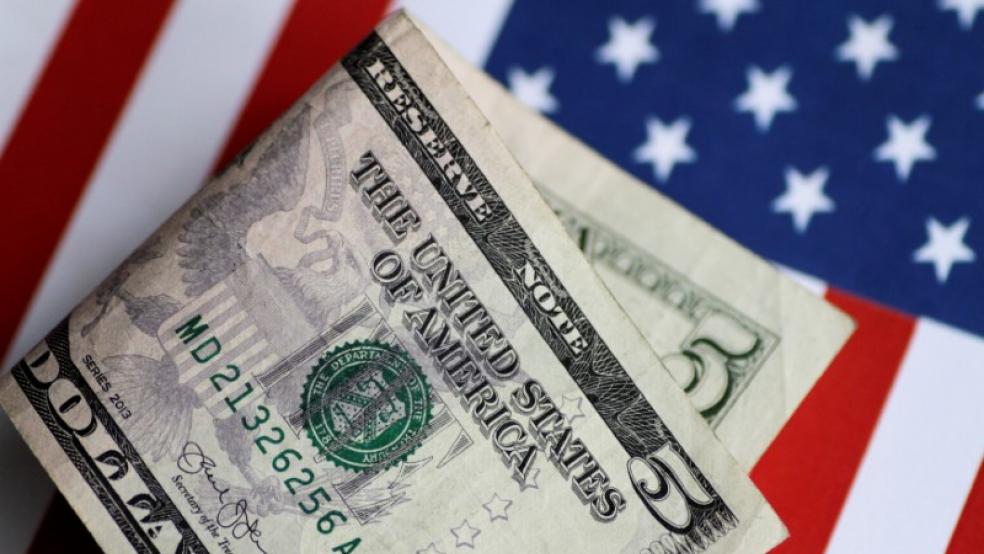NEW YORK (Reuters) - The euro and sterling rose on Thursday and U.S. bond yields spiked as hawkish comments from central banks signaled an end to ultra-loose monetary policy on both sides of the Atlantic, while technology shares dragged Wall Street stocks lower.
The dollar index touched its lowest since October, before Donald Trump was elected U.S. president, as investors shifted to the view that Federal Reserve might not be the only game in town when it comes to higher interest rates.With the Fed approving dividends and buybacks in major banks as part of another round of stress tests, U.S. financial stocks rose but not enough to offset declines in technology and interest rate-sensitive sectors."Part of the reason why tech is down today is the steam in the recent rotation out of some of big tech winners and into banks," said Michael Scanlon, portfolio manager at Manulife Asset Management in Boston.The Dow Jones Industrial Average fell 167.58 points, or 0.78 percent, to 21,287.03, the S&P 500 lost 20.99 points, or 0.86 percent, to 2,419.7 and the Nasdaq Composite dropped 90.06 points, or 1.44 percent, to 6,144.35.European shares logged their biggest one-day loss in nine months as a rising hawkish chorus from central banks weighed on defensive, dividend-paying sectors.The pan-European FTSEurofirst 300 index lost 1.36 percent and MSCI's gauge of stocks across the globe shed 0.54 percent.Emerging market stocks rose 0.19 percent. MSCI's broadest index of Asia-Pacific shares outside Japan closed 0.71 percent higher, while Japan's Nikkei rose 0.45 percent.As euro zone bond yields rallied, the euro surged to as high as $1.1445, its strongest since May 2016. The dollar index fell 0.46 percent, with the euro up 0.55 percent to $1.1439.Bank of England Governor Mark Carney surprised many on Wednesday by conceding a rate hike was likely to be needed as the economy came closer to running at full capacity.That sent sterling above $1.30 on Thursday for the first time in five weeks, leaving it close to its highest levels since last September. The pound was last trading at $1.3006, up 0.63 percent on the day.The Bank of Canada also had its say, with two top policymakers this week suggesting they might tighten monetary policy there as early as July.The Canadian dollar strengthened 0.30 percent versus the greenback at 1.30 per dollar."The shifting monetary policy trajectories of other central banks is making other currencies more attractive relative to the U.S. dollar," said Kathy Lien, managing director at BK Asset Management in New York.The Japanese yen strengthened 0.16 percent versus the greenback at 112.12 per dollar.Benchmark U.S. Treasury yields rose to five-week peaks in sympathy with higher European government debt yields, as investors evaluated the likelihood of less accommodative policy."What's going on in Europe is really what's driving us here," said Brian Daingerfield, a macro strategist at NatWest Markets in Stamford, Connecticut.Treasury 10-year notes last fell 13/32 in price to yield 2.2666 percent, from 2.223 percent late on Wednesday.U.S. oil futures were slightly higher after hitting a two-week peak, extending a rally into a sixth straight session after a decline in weekly U.S. crude production temporarily alleviated concerns about deepening oversupply. Brent ticked lower.U.S. crude rose 0.29 percent to $44.87 per barrel and Brent was last at $47.36, up 0.11 percent on the day.Gold fell as the central bank comments lifted bond yields.Spot gold dropped 0.3 percent to $1,245.31 an ounce. U.S. gold futures fell 0.26 percent to $1,245.80 an ounce.Copper rose 0.75 percent to $5,925.00 a tonne. (Additional reporting by Tanya agvrawal in Bengaluru and Sam Forgione, Karen Brettell and David Gaffen; Editing by Nick Zieminski and Meredith Mazzilli)U.S. dollar falls, bond yields up as central bank views shift

Thomas White



